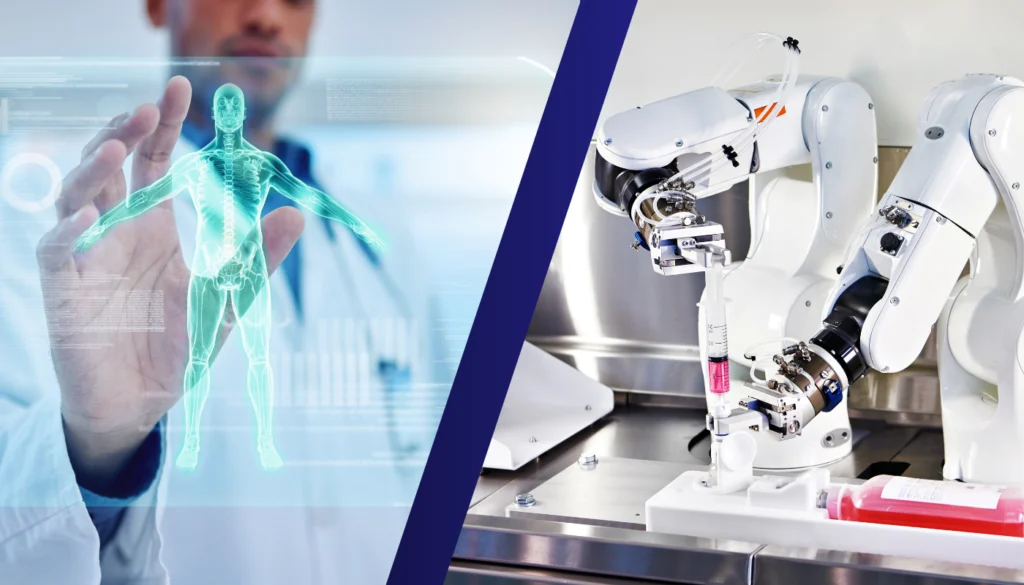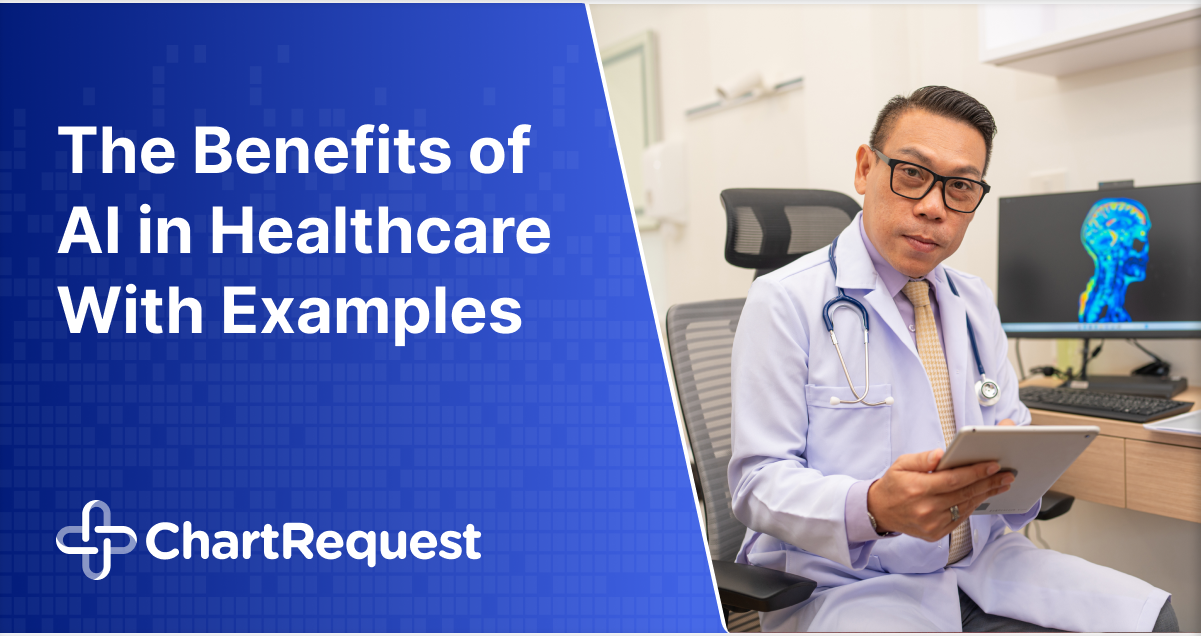AI, or artificial intelligence, refers to computer systems that can process mountains of data to recognize patterns and perform tasks that typically require human intelligence. There are countless benefits of AI in healthcare to eliminate administrative burdens and streamline patient care.
However, integrating AI into healthcare systems requires careful attention to ethical and privacy considerations. Patient data usage must adhere to strict privacy regulations, and AI algorithm biases must be scrutinized and mitigated.
Looking ahead, AI’s future in healthcare is promising. Integrating AI with wearable devices, electronic health records, and telemedicine platforms has the potential to enhance personalized healthcare delivery.
By leveraging the power of AI, healthcare providers can achieve higher efficiency, accuracy, and patient-centric care. In this article, we’ll explore 8 types of AI with healthcare applications and discuss the benefits of AI in healthcare.
What Are the Main Types of AI in Healthcare?
The benefits of artificial intelligence in healthcare are far-reaching because AI is such a versatile tool. Software engineers generally craft their AI tools for specific purposes, so the benefits of AI in healthcare vary based on the function.

This section will explore eight distinct types of AI and their respective roles in improving healthcare outcomes, including:
- Machine Learning
- Natural Language Processing
- Rule-based Expert Systems
- Physical Robots
- Robotic Process Automation
- Diagnosis and Treatment Applications
- Patient Engagement and Adherence Applications
- Administrative Applications.
Each of these AI technologies brings unique capabilities and benefits to the healthcare landscape, revolutionizing patient care, data analysis, decision-making, and administrative processes. These advancements are transforming the healthcare industry and driving better outcomes for both patients and providers.
Machine Learning
Machine learning AI analyzes large datasets to detect patterns and make predictions without explicit programming. When considering the benefits of AI in Healthcare, machine learning has many diverse applications.
One vital application is medical image analysis, where algorithms process and interpret X-rays, CT scans, MRIs, and pathology slides. This improves diagnosis accuracy, speeds up interpretation, and enhances early disease detection.
Machine learning can also predict disease development and risk factors by analyzing patient data. This may include electronic health records, genetics, lifestyle factors, clinical notes, and more. Early detection enables early intervention and personalized preventive measures.
For treatment optimization, algorithms analyze patient outcomes, treatment responses, and clinical guidelines to determine the most effective treatment options. They can also provide recommendations and enhance treatment decision precision and efficiency.
Machine learning also advances healthcare research, drug discovery, and population health management by analyzing biomedical literature and clinical trial data. This uncovers new insights, identifies potential drug targets, and optimizes public health interventions.
Natural Language Processing
The benefits of AI in healthcare are evident through the application of Natural Language Processing (NLP). NLP enables computers to understand and process human language, which has several potential uses in the healthcare industry.
For example, automated transcription of medical records is a key application of NLP. Algorithms analyze spoken or written medical conversations, converting them into structured electronic formats. This saves time for healthcare professionals and facilitates efficient retrieval and analysis of patient information.
NLP also extracts valuable information from unstructured clinical notes. Healthcare providers can automatically extract diagnoses, medications, and treatment plans from vast amounts of textual information. This enables data aggregation for research, quality improvement initiatives, and clinical decision support systems.
Simply put, NLP can scour immense amounts of health data to pull important data. By finding documentation of specific symptoms and analyzing contexts, NLP can significantly mitigate the burdens of manually scouring medical records.
Rules-Based Expert Systems
The benefits of AI in healthcare are also exemplified through rules-based expert systems. These systems emulate the human decision-making process by utilizing predefined rules and knowledge bases. They are used in healthcare for tasks such as diagnosing diseases based on symptoms and providing treatment recommendations.
Transparency and interpretability are key advantages of rules-based expert systems. The explicit rules and knowledge bases help users understand the decision-making process.
By analyzing these factors, healthcare professionals can validate the system’s recommendations and ensure alignment with medical guidelines and best practices. Interpretability also enables the refinement of rules over time, ensuring continuous improvement and accuracy.
Rules-based expert systems excel in rule-based and well-defined domains, such as diagnosing certain diseases. They automate decision-making by codifying specific symptoms, medical history, and test results into rules. This saves time, enhances diagnostic accuracy, and provides consistent decision support.
However, rules-based expert systems have limitations. They may struggle with novel or complex scenarios outside the established rules. They may also require manual intervention to incorporate new knowledge. Handling uncertainty or contradictory information is challenging, as they operate based on rigid rules rather than probabilistic reasoning.
To overcome these limitations, hybrid approaches combining rules-based systems with other AI techniques, like machine learning, are being explored. These hybrids aim to leverage the transparency and interpretability of rules-based systems with the adaptability and learning capabilities of machine learning algorithms.
Physical Robots
Physical robots integrated with AI capabilities provide unique benefits of AI in healthcare. These robots augment the capabilities of healthcare professionals and improve patient outcomes in various healthcare settings.
In surgical applications, AI-powered robots enhance precision, dexterity, and minimally invasive techniques. Surgeons can perform complex procedures with greater accuracy and control, leading to improved surgical outcomes. AI algorithms also analyze real-time data, provide surgical guidance, and enhance decision-making.
In rehabilitation and caregiving settings, AI-powered robotic exoskeletons and assistive devices help patients regain mobility and independence. These robots can also provide targeted assistance, monitor progress, and adjust therapy plans based on real-time feedback and patient data.
Robotic Process Automation (RPA)
The benefits of AI in healthcare are also clear when looking at Robotic Process Automation (RPA). RPA automates repetitive and rule-based administrative tasks, streamlining processes and freeing up human resources for more critical tasks.
RPA improves operational efficiency by automating tasks like appointment scheduling, ensuring accurate and prompt handling of high volumes of patient appointments. This AI also transforms claims processing, as RPA can extract and validate data from insurance claim forms. This also reduces manual effort and expedites reimbursement processes.
RPA enables seamless data integration and exchange across systems. This also eliminates manual data transfer and improves data interoperability. By automating administrative tasks, RPA enables healthcare professionals to focus on patient care and clinical decision-making.
Diagnosis and Treatment Applications
Diagnosis and Treatment Applications also display several benefits of AI in healthcare. These AI-powered applications analyze patient data, medical images, and clinical guidelines to assist healthcare professionals in accurate disease diagnosis and optimal treatment planning.
AI excels in medical imaging analysis, providing precise and efficient evaluations of X-rays, MRIs, and CT scans. By comparing images to vast databases, AI aids in early disease detection and enables timely treatment initiation. Also, AI integrates and analyzes comprehensive patient data, predicting disease progression and identifying risk factors for personalized treatment planning.
Patient Engagement and Adherence Applications
Patient Engagement and Adherence Applications also provide many benefits of AI in healthcare. This AI can provide personalized health recommendations, monitor treatment adherence, and facilitate remote patient monitoring. This empowers patients to take an active role in managing their health.
Personalized health recommendations, such as tailored diet plans, exercise routines, medication reminders, and preventive care measures can improve population health. These individualized recommendations can also help each patient make informed decisions and adopt healthy behaviors.
Monitoring treatment adherence is critical, and AI-powered applications can track adherence patterns, send reminders, and provide support. AI algorithms identify barriers to adherence, adjust treatment plans, and enhance patient compliance.
Remote patient monitoring powered by AI enables real-time data transmission from wearable devices and sensors, facilitating proactive care management. AI can also analyze data to identify potential health issues, leading to early intervention and improved disease management.
Administrative Applications
Lastly, the benefits of AI in healthcare are significant with Administrative Applications. These can revolutionize tasks such as billing and coding, resource allocation, and operational optimization. By leveraging administrative AI algorithms, healthcare organizations can streamline processes, reduce costs, and improve overall efficiency.
In billing and coding, AI automates processes, identifies codes, and improves accuracy. This can help reduce errors and claim rejections to ensure accurate care reimbursement. By automating these tasks, organizations can allocate resources efficiently and focus on patient care.
Resource allocation is enhanced by AI, which analyzes data to predict future demand and optimize staffing, equipment, and facility planning. AI-driven insights ensure optimal resource utilization.
AI analysis of patient records, appointment schedules, and inventory levels can also identify areas for improvement and streamline workflows. AI also automates tasks like appointment scheduling to reduce wait times and maximize efficiency.
Do the Risks Outweigh the Benefits of AI in Healthcare?
When considering adopting AI technology, it’s important to weigh the risks against the benefits of AI in healthcare. While developers work to offset these risks, we must acknowledge that AI programs can’t think critically about how they function.
One significant risk is the potential for bias within AI systems. If these systems are trained on biased data, they can perpetuate or amplify existing biases, leading to unfair or inaccurate decisions. This bias could have far-reaching consequences, such as disparities in diagnoses or treatment recommendations across different demographic groups.
Another risk associated with AI in healthcare is the potential for job loss in certain occupations. As AI technology automates tasks like data entry and administrative support, there may be a reduced need for human involvement in these roles. While AI can streamline workflows and improve efficiency, it is important to consider the impact on the workforce and explore opportunities for reskilling or redeployment of affected healthcare professionals.
Privacy concerns also arise with the use of AI systems in healthcare. These systems often rely on collecting and analyzing personal data to provide accurate diagnoses or personalized treatment recommendations. However, if not appropriately safeguarded, this data could be vulnerable to breaches, misuse, or unauthorized access. Striking the right balance between utilizing patient data to advance healthcare and ensuring robust privacy protections is essential for fostering trust in AI applications.
Addressing these risks requires a multifaceted approach that involves transparency, responsible data practices, robust security measures, and ongoing ethical evaluation. By acknowledging and proactively mitigating these risks, healthcare organizations can harness the potential of AI while safeguarding patient welfare and upholding ethical standards.
Despite the Benefits of AI in Healthcare, Human Intelligence Will Always Be Important
There are countless benefits of AI in healthcare, but when accuracy matters, there’s no replacement for human intelligence. By augmenting human intelligence with technology, healthcare organizations can reach new peaks of efficiency and productivity.
AI has potential to change the medical industry in the future for good, but it’ll likely always require human interaction. From patient empathy to critical reasoning, there are certain skills that can’t be achieved with 1s and 0s.
ChartRequest is a release of information software solution that enables healthcare professionals to streamline medical records release. By minimizing the administrative burdens of ROI, we enhance the capabilities of human intelligence. This helps ensure compliance with HIPAA, the 21st Century Cures Act, and other key regulations.
Like a carpenter uses both screwdrivers and drills, healthcare organizations can benefit by utilizing tools with and without AI augmentation. With over a decade of cutting-edge experience, ChartRequest can reduce ROI costs, centralize processes, provide comprehensive productivity reports, and more.
Has your organization experienced release of information challenges like staffing shortages or difficulty meeting ROI deadlines? We’ll help determine if ChartRequest is right for you!


